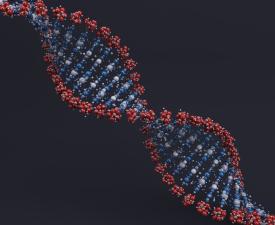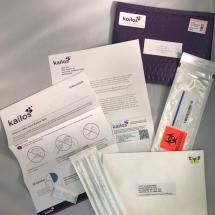Your Sensitivity to Medications is Coded in Your Genes
Variation in our genes compared to another person’s genes isn’t an inherently bad thing; in fact, all of those changes in our DNA--our As, Cs, Gs and Ts--are the genetic code that makes us who we are as individuals. Variations in certain genes, however, can change the way our body handles and converts medications, and sometimes with very serious consequences.

Take, for instance, the case of Harold,1 a 62-year-old man with leukemia.2 Harold seeks medical treatment for fatigue, trouble breathing, fever and a cough. The physician’s tests and observations suggest that Harold is suffering from pneumonia, and appropriate procedures are performed and several medications are initiated: three drugs to kill bacteria and fungi and codeine to manage Harold’s cough. By the fourth day of Harold’s hospital stay, he becomes unresponsive and his blood oxygen levels quickly deteriorate. He is put on a ventilator and moved to the intensive care unit, where his blood oxygen improves, but his responsiveness does not. In the absence of any other abnormal tests, doctors administer naloxone, a drug used to counteract the effects of opioids, such as codeine, the drug that Harold was administered at an appropriate dose to manage his cough. The naloxone dose is repeated two times and Harold experiences a dramatic improvement in his responsiveness. Harold went on to make a full recovery.
What went wrong? Harold’s clinicians suspected that something was amiss with how Harold metabolized, or how his body handled and changed, the codeine that was introduced to his system, causing him to overdose on a dosage of codeine that is considered safe for a person of his size and medical background. Subsequent genetic analysis of Harold’s DNA revealed that he possessed at least one extra copy of the CYP2D6 gene, which codes, or provides the instructions to build, a protein responsible for converting codeine into the opiate morphine, the chemical that relieves pain. Harold’s extra copy of CYP2D6 caused ultra-rapid conversion of codeine to morphine, contributing to the opiate overdose he experienced during his hospital stay.
Variations in your genes do not always cause your body to convert or modify drugs faster than another person. In fact, the very opposite can be true. A 14-year-old girl, Charlotte, who cannot communicate physically or verbally, is one such example.3 Charlotte’s mother brings Charlotte to the ER for difficulty breathing and jerking movements. The previous night, Charlotte’s mother gave her daughter Tylenol #3, a combination of Tylenol, caffeine and codeine, to treat her hip pain. The morning of the ER visit, Charlotte’s mother gave Charlotte another dose of Tylenol #3 to treat the same perceived hip pain. The clinician observes the same pain symptoms Charlotte’s mother describes, and although codeine overdose would be rare in this case, the clinician gives Charlotte naloxone on the off chance her breathing difficulties are due to an opiate overdose. The naloxone eases her breathing and the doctor recommends genetic analysis of Charlotte’s CYP2D6 gene. The doctor suspects that Charlotte possesses a variation in her CYP2D6 gene that causes ultra-fast conversion of codeine to morphine, as we observed in Harold’s case. Interestingly, when the genetic results come back, Charlotte’s CYP2D6 gene variations don’t cause ultra-fast conversion of codeine to morphine at all. In fact, Charlotte has variations in her CYP2D6 gene that make her gene nonfunctional, which rendered the codeine she received completely ineffective. The doctor surmises that Charlotte’s symptoms were actually caused by a lack of pain relief, rather than an overdose of the codeine administered by Charlotte’s mother, and it still remains unclear why the naloxone was beneficial in relieving Charlotte’s labored breathing.
Here, we see two cases where different variations of the CYP2D6 gene result in very different responses to the drug codeine. Depending on the specific drug and an individual’s particular gene variants, that individual may experience heightened, suboptimal, or no effects from a drug, which may raise safety concerns about the use of particular drugs in patients with relevant gene variants. Pharmacogenetic testing, or genetically analyzing particular genes in your DNA and identifying how they affect your body’s response to different drugs, is a powerful tool that can help you and your physician avoid negative drug reactions and make more informed decisions when initiating a medication. Our case studies highlight the utility of pharmacogenetic testing in determining a safe and effective medication treatment plan tailored for every unique patient.
Advances in DNA sequencing and analysis make it possible to determine gene variants in specific genes associated with an individual’s response to many different drugs. Kailos Genetics has developed the InspexionTM pharmacogenetic test to painlessly, quickly and affordably determine genetic variation in different pharmacogenes, including CYP2D6, and predict a patient’s response to different classes of medications, including antidepressants, opioids such as codeine, HIV/AIDS drugs, statins and cancer therapies. Kailos Genetics is a CLIA-certified laboratory that uses next generation sequencing and our TargetRichTM proprietary workflow to produce high quality DNA sequences with unparalleled accuracy. To order the Inspexion test or any of our other genetic tests, please visit our website at www.kailosgenetics.com.

The test is completely noninvasive and requires only a cheek cell sample that you can collect yourself using a cotton swab in your own home. Once we receive your sample, we sequence and analyze the pharmacogenes that make up the Inspexion panel within 2 weeks and release your results to your physician to discuss with you one-on-one.




